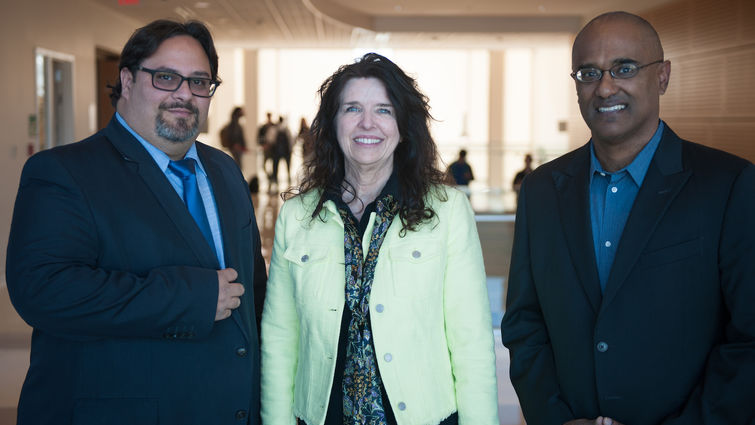
Loma Linda University Cancer Center has appointed three cancer researchers to lead the center’s commitment to premium cancer care through development of new methods of discovery and treatment.
Frankis Almaguel, PhD, MD, will serve as director of the Molecular Imaging and Therapeutics Research Program; Kim Payne, PhD, will serve as director of the Pediatric Leukemia Research Program; and Pramil Singh, DrPH, will serve as director of the Tobacco Cessation Research Program.
LLU Cancer Center director Mark E. Reeves, PhD, MD, said the new appointments are instrumental in the organization’s drive to improve treatment and diagnosis of patients, create resources for tobacco cessation and identify a cure for pediatric leukemia. Reeves believes the three new leaders will successfully address quests for cures and advance diagnostics and treatment.
“These three directors lead important initiatives the cancer community worldwide has struggled to tackle,” Reeves said. “I have full confidence they can pave the way to a better future for patients who are battling deadly diseases.”
The National Cancer Institute estimates 1.73 million new cases of cancer will be diagnosed this year and more than 600,000 Americans will die from the disease.
According to Reeves, key objectives within the cancer community internationally are improving customizable and precise cancer treatment and diagnoses, filling the need for solutions for the cessation of smoking — which has been found to be one of the major cancer causes — and developing a cure in pediatric leukemia.
More about the three new directors
Almaguel said his goal of the Molecular Imaging and Therapeutics Research Program is to increase the use of lifesaving precision medicine for identifying cancer cells and treatment. The method of molecular imaging includes the use of cancer-specific biomarkers, which are indicators of the severity or presence of the disease. This novel type of imaging allows physicians to determine whether a specific drug or treatment is the right one for the right patient at the right time, enhancing precision in oncology. Once the cancer is identified, the same biomarkers specifically designed to identify the cancer cells are modified to destroy the tumors without killing healthy cells. Currently, chemotherapy is not as precise, often harming healthy cells or organs which affects the patient's quality of life. Almaguel believes that each patient deserves a personalized treatment plan specifically tailored to the patient's medical needs.
Through the Pediatric Leukemia Research Program, Payne is working to find a cure for pediatric leukemia — in particular, a cure for one very aggressive type of B-cell acute lymphoblastic leukemia (B-ALL). This type of B-ALL is the one of the deadliest cancers in children and it disproportionately targets Hispanic children with Native American ancestry — largely the patient base at Loma Linda University Children’s Hospital. Payne believes she and her team are closer to a treatment after their recent discovery that patients who were given high levels of a molecule required to produce leukemia both kills the leukemia cells and helps normal B-cells recover and come back stronger, according to the team’s data.
Singh’s focus at the Transdisciplinary Tobacco Research Program is on innovative cessation methods locally and globally for one of the primary concerns for disease burdens in the U.S.: tobacco. During the COVID-19 pandemic, the importance of tobacco control and tobacco control research has grown. Program faculty have responded by publishing NIH-funded research linking smoked tobacco to infectious disease in rural Asia. Also, program faculty have recently submitted a series of grant proposals to investigate pathogen transmission on the surface of tobacco pipes. More grants on tobacco and infectious disease pathways — including COVID-19 — are planned. The program has received grant funding from several NIH institutes and is working with Pfizer Foundation to conduct a smoking cessation trial in Mongolia. Singh plans to continue working with a team of researchers to curtail tobacco use globally.
